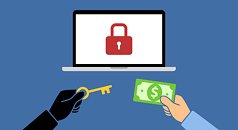Raevenlord
News Editor
- Joined
- Aug 12, 2016
- Messages
- 3,755 (1.16/day)
- Location
- Portugal
| System Name | The Ryzening |
|---|---|
| Processor | AMD Ryzen 9 5900X |
| Motherboard | MSI X570 MAG TOMAHAWK |
| Cooling | Lian Li Galahad 360mm AIO |
| Memory | 32 GB G.Skill Trident Z F4-3733 (4x 8 GB) |
| Video Card(s) | Gigabyte RTX 3070 Ti |
| Storage | Boot: Transcend MTE220S 2TB, Kintson A2000 1TB, Seagate Firewolf Pro 14 TB |
| Display(s) | Acer Nitro VG270UP (1440p 144 Hz IPS) |
| Case | Lian Li O11DX Dynamic White |
| Audio Device(s) | iFi Audio Zen DAC |
| Power Supply | Seasonic Focus+ 750 W |
| Mouse | Cooler Master Masterkeys Lite L |
| Keyboard | Cooler Master Masterkeys Lite L |
| Software | Windows 10 x64 |
"Where's my Bitcoin?" is a question no miner, investor or mere user in the cryptocurrency ever wants to have to ask. There's always someone willing to take advantage of someone else's hard work or subjection to risk in order to increase their own value; and if there's something years of cyber security have told us, is that hackers seldom lag in picking up new sources of undeserved revenue. So it was only a matter of time before general purpose ransomware started seeing updates so as to take advantage of the newer trends in valuable assets. Enter cryptocurrency. And you can probably guess the rest of this piece.
The new, updated Cerber ransomware routine now not only encrypts a user's files, it also looks for some specific, known Bitcoin wallet applications (namely, and as of time of writing, Bitcoin Core, Electrum, and Multibit), copies them to an external server controlled by the hackers, and proceeds to delete them from the user's PC. Naturally, Cerber also has a routine that handles copying passwords that are stored in your browser of choice. The wallet stealing and copying isn't much of a concern per se; there are additional security measures in any given wallet before the hackers can access their potential treasure trove of cryptocurrency. However, many people also keep files with passwords or some such on their computers; and could be doing a disfavor to themselves by not keeping another copy of their wallets on a secure, non-internet connected hardware wallet, or even USB pen. Naturally, a user who kept the password for their wallet on their system is vulnerable to the entire "ransomware" portion of the Cerber malware; and if someone doesn't even have another copy of their wallet but keeps an ungodly amount of value in it, could very well be facing losses towards the entirety of their wallet. Definitely not a good place to be.

View at TechPowerUp Main Site
The new, updated Cerber ransomware routine now not only encrypts a user's files, it also looks for some specific, known Bitcoin wallet applications (namely, and as of time of writing, Bitcoin Core, Electrum, and Multibit), copies them to an external server controlled by the hackers, and proceeds to delete them from the user's PC. Naturally, Cerber also has a routine that handles copying passwords that are stored in your browser of choice. The wallet stealing and copying isn't much of a concern per se; there are additional security measures in any given wallet before the hackers can access their potential treasure trove of cryptocurrency. However, many people also keep files with passwords or some such on their computers; and could be doing a disfavor to themselves by not keeping another copy of their wallets on a secure, non-internet connected hardware wallet, or even USB pen. Naturally, a user who kept the password for their wallet on their system is vulnerable to the entire "ransomware" portion of the Cerber malware; and if someone doesn't even have another copy of their wallet but keeps an ungodly amount of value in it, could very well be facing losses towards the entirety of their wallet. Definitely not a good place to be.

View at TechPowerUp Main Site
Last edited by a moderator:



